Share
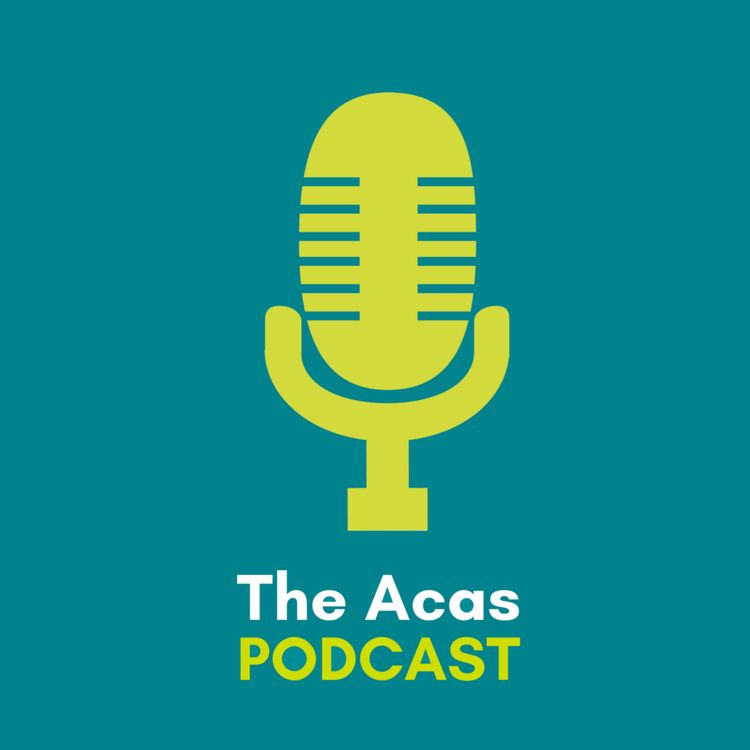
The Acas Podcast
Discussing menopause at work
Supporting the menopause at work is important for both employers and their staff. In this episode we will discuss how organisations can create a supportive and inclusive environment, and the considerations they should be aware of to help their staff with menopause at work.
We are joined by Haitham Hamoda, Clinical Lead for the menopause service at King's College Hospital and the immediate past Chair from the British Menopause Society, and Kate Nowicki, Director of Dispute Resolution at Acas.
We discuss:
· How to handle menopause at work
· Creating a supportive environment
· Legal rights and considerations
Episode resources:
Advice and guidance on how to handle menopause at work: https://www.acas.org.uk/menopause-at-work
The British Menopause Society support and advice: https://thebms.org.uk
Simone Cheng’s blog on ‘Normalising the menopause’: https://www.acas.org.uk/normalising-the-menopause
Michelle Piertney’s blog on ‘Breaking the silence on the menopause’: https://www.acas.org.uk/breaking-the-silence-on-the-menopause
To contact an Acas adviser for specialist support, get in touch
Sign up to menopause and the workplace training
For podcast and event updates sign up to our free email newsletter
Transcript available at www.acas.org.uk/podcast/discussing-menopause-at-work
More episodes
View all episodes
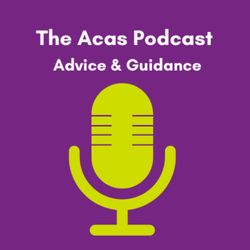
How employee voice improves engagement
16:53|In the latest episode of the Acas podcast, we talk to Susan Reilly and Emma Hughes from the Phoenix Group about setting up an employee forum.They tell us why this method of hearing employee voice works for them, and how it has supported the organisation through change.The conversation also covers:How employee forum relationships differ from HR and trade unionsForum structureWhat the forum coversForum governanceHost:Terry Duffy - Strategic Lead, Growth Partnership, AcasGuests:Susan Reilly - Head of Phoenix Employee Representation ForumEmma Hughes - Communication and Engagement Consultant, Phoenix Employee Representation ForumFor more information about staff forums please visit our advice page: Using workplace forums to discuss important matters at work.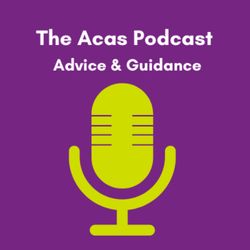
Informal conversations – the key to reducing workplace conflict?
19:42|In this episode of the Acas Podcast, Terry Duffy (Strategic Lead, Acas) sits down with Professor Richard Saundry (Principle Research Fellow, University of Westminster) to discuss the benefits of upskilling line manages and giving them the confidence to address conflict at the earliest possible stage with an informal conversation.This is a must listen for anyone with line management responsibilities, HR practitioners and anyone with an interest in good workplace relations. Further reading: Acas blog: Skilled Managers Productive Workplaces - Translating research into workplace practice that worksTraining: Conflict management skills online course
Understanding neurodiversity in the workplace
32:41|In this episode of the Acas Podcast, we’re joined by guest speakers, Professor Almuth McDowall, Professor of Organisational Psychology at Birkbeck University, and Jodie Hill, Managing Partner and founder of Thrive Law, for a deep dive discussion on neurodiversity in the workplace. The conversation covers: · What does it mean to be ‘neuro inclusive’?· What the latest research tells us· What workplaces can do to be more inclusive of neurodivergent individuals· The role of line managers· What small businesses can do· Managing conflict, and much more… Jodie will be speaking at the upcoming Acas conference - Resetting employment relations: building healthy workplaces to grow a strong economy, 15 May 2025, QEII, London. For more information: view agenda | register Presenter: · Ruhel Ahmed - Senior Policy Adviser, Acas Guidance: https://www.acas.org.uk/neurodiversity-at-work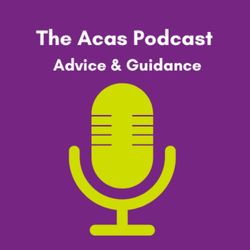
Introducing mediation in the workplace
12:51|In this episode of the Acas Advice & Guidance podcast we talk to Angela Wright, Organisational Lead at Tees, Esk and Wear Valleys NHS Foundation about introducing mediation into the workplace. Our conversation covers the benefits and challenges of introducing mediation and will be of interest to anyone involved with conflict resolution in the workplace or people managers. For more information on how Acas can support you with workplace mediation please visit our mediation page on the Acas website. Further reading: Acas blog - Making the case for mediation.
Disability discrimination at work - why the increase?
26:41|In recent years, the number of disability discrimination claims going to employment tribunal has increased. What is causing this increase and what are the characteristics of these claims? Julie Dennis, Head of Inclusive Workplace Policy at Acas is joined by Dr Martin Mitchell, Senior Researcher at the National Centre for Social Research (NatCen) to discuss the latest research commissioned by Acas that takes a closer look at the lifecycle of a disability discrimination tribunal claims. They also discuss what organisations and people managers can do to better support colleagues with disabilities. Guidance and support: Disability at work | Flexible working Further reading: Research: Characteristics and drivers of disability discrimination claims
SMEs and mediation - what's the problem?
23:30|SMEs and mediation – what’s the problem? In the latest Acas Podcast, Emma McClean, Acas Individual Dispute Resolution Manager, talks to Martin McTague, National Chair of the Federation of Small Businesses, to discuss early, informal dispute resolution, such as mediation. They also discuss the barriers small businesses face when introducing or using mediation in the workplace and the perception of Acas impartiality. Guidance and support: Acas - For more information and guidance about mediation please visit the Acas mediation webpage. FSB - For details about the legal and HR support available from FSB as part of its membership package, visit fsb.org.uk/membership. Mediation Conference: UK Mediation Conference 2024 –25TH November 2024 | Congress Centre, London | 08:30-17:40 The UK’s leading conference bringing together Mediators, HR Professionals and Leaders. This industry-leading event will examine the conflict journey, the evidence supporting the case for a less formal approach[CR1] , including examples on what works (and what doesn’t) and partial mediation skills and techniques. To find out more visit our event page. To book your place visit our event registration page.Further reading: Making the case for mediation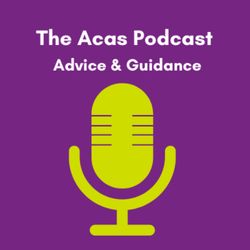
Flexible working - what you need to know
09:57|Welcome to the first episode of the new Acas Advice & Guidance podcast. In this shorter format series, we will discuss the key-points of the latest employment relations issues and will sign-post to further advice, guidance, and support. In this episode we will be discussing what you need to know about flexible-working – What it is, the main changes and what you need to do. For more information visit the Acas flexible working page.
Inclusive workplaces - supporting women through menopause
32:07|Inclusive workplaces – supporting women through menopause In this episode we discuss how workplaces can better support women going through menopause. Helen Tomlinson discusses her role as the Governments first ever Menopause Employment Champion and Kate Nowicki gives her thoughts and observation from her role as Acas Menopause Champion. We’re joined by: · Helen Tomlinson – Head of Talent (UK & Ireland) for the Adecco Group and Menopause Employment Champion · Kate Nowicki – Director of Dispute Resolution for Acas. We discuss: · The role of allyship· Importance of workplace culture · Implementing a menopause policy Transcript available here: Episode resources: Further reading. Menopause at work guidance: https://www.acas.org.uk/menopause-at-work Menopause and the law: https://www.acas.org.uk/menopause-at-work/menopause-and-the-law Upcoming events:. Conference: Living and working with menopause https://obs.acas.org.uk/ViewEvent.aspx?EventId=207038 For podcast and event updates sign up to our free email newsletter.
Mental health at work: reasonable adjustments
28:47|In this episode we will explore how employers can support their staff with reasonable adjustments for mental health, creating a healthy work culture and demonstrating a commitment to good practice.We’re joined by:Jo Yarker, Managing Partner at Affinity Health at WorkJulie Denning, Managing Director of Working To Wellbeing and Chair of the Vocational Rehabilitation AssociationFrancoise Woolley, Head of Mental Health and Wellbeing at AcasWe discuss:what reasonable adjustments for mental health arewhat the law sayssupporting health and wellbeingTranscript available at www.acas.org.uk/podcast/mental-health-at-work-reasonable-adjustmentsEpisode resources:Find out more about reasonable adjustments for mental health at workYou can also:read research and case studies about reasonable adjustments for mental healthfind training on mental health in the workplace Use our templates for:making a mental health reasonable adjustment requestconfirming mental health reasonable adjustmentsreviewing and monitoring reasonable adjustments for mental healthNICE guideline: Mental wellbeing at workFor podcast and event updates sign up to our free email newsletter